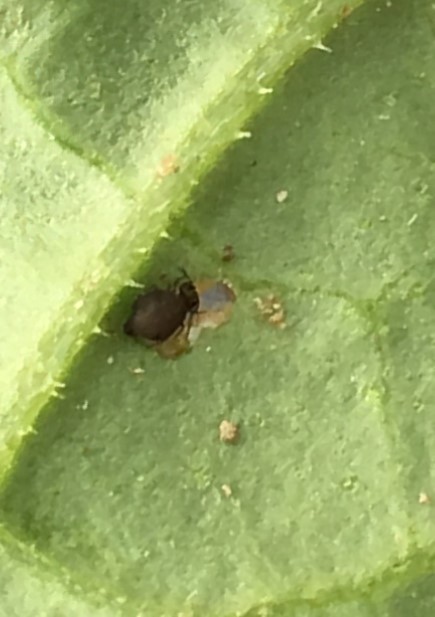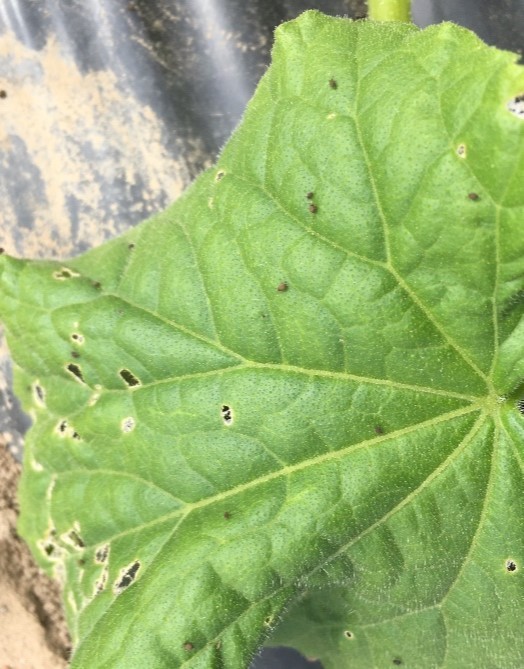A Spring Tale of Springtails
Teresa Rusinek, Vegetable Specialist
Eastern New York Commercial Horticulture
Last week, I went to check on a problem a grower was having in his high tunnel cucumber crop. Carefully inspecting the leaves, I found many tiny, 1/16th of inch-long insects all over the cucumber plants. They jumped about from one cucumber plant to the next, munching away at tender foliage that was beginning to look like Swiss cheese!
The minuscule insects turned out to be springtails. In my 20+ years diagnosing vegetable pest problems, I've never come across these as a crop pest. For the most part springtails, also known as Collembola, feed on decaying plant material and are considered beneficial. But, under dry soil conditions, springtails seeking moisture may feed on and cause significant injury to young plants. The damage and appearance of springtails can look very much like flea beetles, but we don't typically see flea beetles attacking cucumber and the springtails are about half the size of a flea beetle. Similar to a flea beetle, they will spring away when disturbed using a structure under their abdomen called a furcular.
Springtails have been reported feeding on many veg crops including beans, beets broccoli potato radish, and even garlic. According to Cornell pest management guidelines, "These insects are generally susceptible to insecticides and are likely to be controlled when an application is made to control another seedling pest."
Springtails lay eggs in moist soil with high organic matter. The eggs hatch out into juveniles in about 10 days and then molt multiple times throughout the season. Adults may live through the year but only seem to be a problem to crops in May or June when plants are small and tender.
This article is from the May 17 2018 edition of the ENYCHP Vegetable News. Click Here to view the full newsletter.



Upcoming Events
Vegetable Field Meetings with Dr. Steve Reiners
July 14, 2025 : Herkimer County - Ivan Martin's Farm
Herkimer, NY
Topics: Tomato Fertility and Mitigating Physiological Disorders; Pest Scouting, ID, and IPM Field Walk.
July 15, 2025 : Washington County - Hand Melon Farm
Greenwich, NY
Topics: Tomato Fertility and Mitigating Physiological Disorders, Tomato and Sweet Corn IPM; FSMA Water Assessments and Postharvest Sanitation
July 16, 2025 : Ulster County - Wallkill View Farm
New Paultz, NY
Topics: Tomato Fertility and Mitigating Physiological Disorders; Veg Pest Update and Management; Cornell Tomato Breeding Program and Slicer Tomato Variety Trial Tour
2025 Berry Twilight Meetings
July 2, 2025 : Berry Twilight Meeting at Dressel Farms
New Paltz, NY
Join Heather Kase, CCE ENYCHP, and Anna Wallis, Cornell IPM, for seasonal updates on berry pest man-agement and IPM.
July 16, 2025 : Berry Twilight Meeting at Samascott Orchards
Kinderhook, NY
Join Heather Kase, CCE ENYCHP, and Anna Wallis, Cornell IPM, for seasonal updates on berry pest man-agement and IPM.
August 6, 2025 : Berry Twilight Meeting at Fishkill Farms
Hopewell Junction, NY
Join Heather Kase, CCE ENYCHP, and Anna Wallis, Cornell IPM, for seasonal updates on berry pest man-agement and IPM.
Champlain Valley Orchard Field Afternoon
July 17, 2025 : Champlain Valley Orchard Field Afternoon
Chazy, NY
This July ENYCHP will be hosting an orchard field afternoon highlighting Mike's research trials at Chazy Orchards.












































